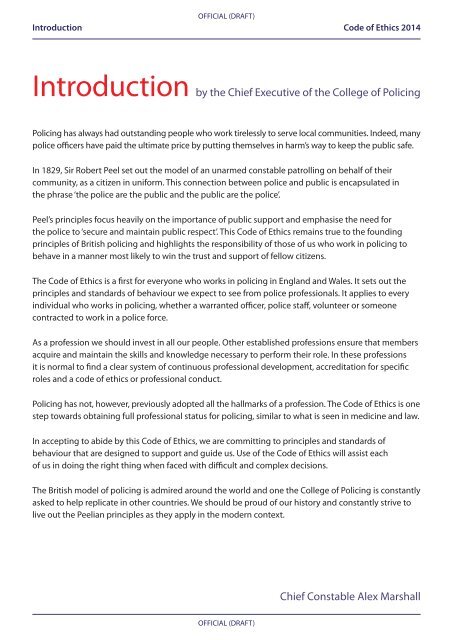Code of Ethics 2014
Code of Ethics 2014
Code of Ethics 2014
Create successful ePaper yourself
Turn your PDF publications into a flip-book with our unique Google optimized e-Paper software.
OFFICIAL (DRAFT)<br />
Introduction <strong>Code</strong> <strong>of</strong> <strong>Ethics</strong> <strong>2014</strong><br />
Introduction by the Chief Executive <strong>of</strong> the College <strong>of</strong> Policing<br />
Policing has always had outstanding people who work tirelessly to serve local communities. Indeed, many<br />
police <strong>of</strong>ficers have paid the ultimate price by putting themselves in harm’s way to keep the public safe.<br />
In 1829, Sir Robert Peel set out the model <strong>of</strong> an unarmed constable patrolling on behalf <strong>of</strong> their<br />
community, as a citizen in uniform. This connection between police and public is encapsulated in<br />
the phrase ‘the police are the public and the public are the police’.<br />
Peel’s principles focus heavily on the importance <strong>of</strong> public support and emphasise the need for<br />
the police to ‘secure and maintain public respect’. This <strong>Code</strong> <strong>of</strong> <strong>Ethics</strong> remains true to the founding<br />
principles <strong>of</strong> British policing and highlights the responsibility <strong>of</strong> those <strong>of</strong> us who work in policing to<br />
behave in a manner most likely to win the trust and support <strong>of</strong> fellow citizens.<br />
The <strong>Code</strong> <strong>of</strong> <strong>Ethics</strong> is a first for everyone who works in policing in England and Wales. It sets out the<br />
principles and standards <strong>of</strong> behaviour we expect to see from police pr<strong>of</strong>essionals. It applies to every<br />
individual who works in policing, whether a warranted <strong>of</strong>ficer, police staff, volunteer or someone<br />
contracted to work in a police force.<br />
As a pr<strong>of</strong>ession we should invest in all our people. Other established pr<strong>of</strong>essions ensure that members<br />
acquire and maintain the skills and knowledge necessary to perform their role. In these pr<strong>of</strong>essions<br />
it is normal to find a clear system <strong>of</strong> continuous pr<strong>of</strong>essional development, accreditation for specific<br />
roles and a code <strong>of</strong> ethics or pr<strong>of</strong>essional conduct.<br />
Policing has not, however, previously adopted all the hallmarks <strong>of</strong> a pr<strong>of</strong>ession. The <strong>Code</strong> <strong>of</strong> <strong>Ethics</strong> is one<br />
step towards obtaining full pr<strong>of</strong>essional status for policing, similar to what is seen in medicine and law.<br />
In accepting to abide by this <strong>Code</strong> <strong>of</strong> <strong>Ethics</strong>, we are committing to principles and standards <strong>of</strong><br />
behaviour that are designed to support and guide us. Use <strong>of</strong> the <strong>Code</strong> <strong>of</strong> <strong>Ethics</strong> will assist each<br />
<strong>of</strong> us in doing the right thing when faced with difficult and complex decisions.<br />
The British model <strong>of</strong> policing is admired around the world and one the College <strong>of</strong> Policing is constantly<br />
asked to help replicate in other countries. We should be proud <strong>of</strong> our history and constantly strive to<br />
live out the Peelian principles as they apply in the modern context.<br />
Chief Constable Alex Marshall<br />
OFFICIAL (DRAFT)


